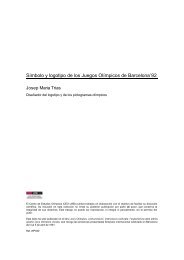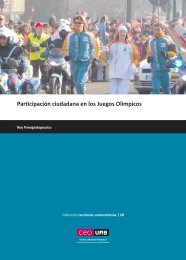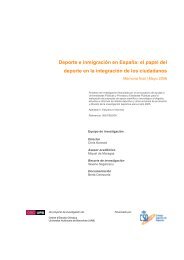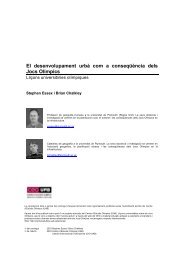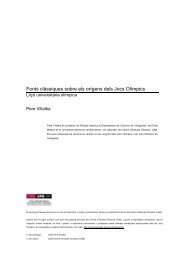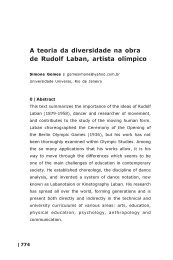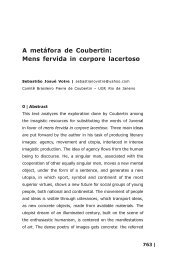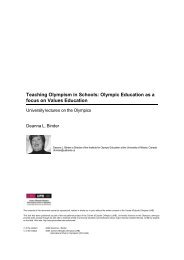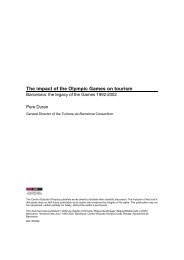Olympic education: university lecture on the Olympics
Olympic education: university lecture on the Olympics
Olympic education: university lecture on the Olympics
Create successful ePaper yourself
Turn your PDF publications into a flip-book with our unique Google optimized e-Paper software.
<str<strong>on</strong>g>Olympic</str<strong>on</strong>g> <str<strong>on</strong>g>educati<strong>on</strong></str<strong>on</strong>g><br />
University <str<strong>on</strong>g>lecture</str<strong>on</strong>g> <strong>on</strong> <strong>the</strong> <str<strong>on</strong>g>Olympic</str<strong>on</strong>g>s<br />
Norbert Müller<br />
Dr. Müller is professor at <strong>the</strong> University of Mainz and Member of <strong>the</strong> IOC Commissi<strong>on</strong> for Culture and<br />
<str<strong>on</strong>g>Olympic</str<strong>on</strong>g> Educati<strong>on</strong>.<br />
muellern@uni-mainz.de<br />
The c<strong>on</strong>tents of this document cannot be reproduced, nei<strong>the</strong>r in whole nor in part, without <strong>the</strong> written c<strong>on</strong>sent of <strong>the</strong> Centre d’Estudis<br />
Olímpics (UAB).<br />
This text has been published as part of <strong>the</strong> <str<strong>on</strong>g>educati<strong>on</strong></str<strong>on</strong>g>al project of <strong>the</strong> Centre d’Estudis Olímpics (UAB), University <str<strong>on</strong>g>lecture</str<strong>on</strong>g>s <strong>on</strong> <strong>the</strong><br />
<str<strong>on</strong>g>Olympic</str<strong>on</strong>g>s, aiming to provide open access through its web site to material aimed at <str<strong>on</strong>g>university</str<strong>on</strong>g> students and professors about major<br />
<str<strong>on</strong>g>Olympic</str<strong>on</strong>g>-related <strong>the</strong>mes, written by experts <strong>on</strong> <strong>the</strong> field. Web site: http://olympicstudies.uab.es/<str<strong>on</strong>g>lecture</str<strong>on</strong>g>s/<br />
© of <strong>the</strong> c<strong>on</strong>tent 2004 Norbert Müller<br />
© of <strong>the</strong> editi<strong>on</strong> 2004 Centre d’Estudis Olímpics (UAB)<br />
Internati<strong>on</strong>al Chair in Oly mpism (IOC-UAB)
To refer to this document, you can use <strong>the</strong> following reference:<br />
© 2004 Centre d’Estudis Olímpics (UAB)<br />
Internati<strong>on</strong>al Chair in Olympism (IOC-UAB)<br />
Norbert Müller – <str<strong>on</strong>g>Olympic</str<strong>on</strong>g> <str<strong>on</strong>g>educati<strong>on</strong></str<strong>on</strong>g><br />
Müller, Norbert (2004): <str<strong>on</strong>g>Olympic</str<strong>on</strong>g> <str<strong>on</strong>g>educati<strong>on</strong></str<strong>on</strong>g>: <str<strong>on</strong>g>university</str<strong>on</strong>g> <str<strong>on</strong>g>lecture</str<strong>on</strong>g> <strong>on</strong> <strong>the</strong> <str<strong>on</strong>g>Olympic</str<strong>on</strong>g>s [<strong>on</strong>line article]. Barcel<strong>on</strong>a : Centre d’Estudis Olímpics<br />
(UAB). Internati<strong>on</strong>al Chair in Olympism (IOC-UAB). [Date of c<strong>on</strong>sulted: dd/mm/yy]<br />
<br />
[Date of publicati<strong>on</strong>: 2004]<br />
2
Summary<br />
© 2004 Centre d’Estudis Olímpics (UAB)<br />
Internati<strong>on</strong>al Chair in Olympism (IOC-UAB)<br />
Norbert Müller – <str<strong>on</strong>g>Olympic</str<strong>on</strong>g> <str<strong>on</strong>g>educati<strong>on</strong></str<strong>on</strong>g><br />
1. Introducti<strong>on</strong> .................................................................................................... 5<br />
2. Peace <str<strong>on</strong>g>educati<strong>on</strong></str<strong>on</strong>g> as a starting point ........................................................................................ 5<br />
3. “Religio athletae” as an anthropological foundati<strong>on</strong> .............................................................. 6<br />
4. Coubertin’s Olympism between <str<strong>on</strong>g>educati<strong>on</strong></str<strong>on</strong>g> and ideology ...................................................... 7<br />
From Olympism to <str<strong>on</strong>g>Olympic</str<strong>on</strong>g> <str<strong>on</strong>g>educati<strong>on</strong></str<strong>on</strong>g> .................................................................................... 7<br />
Recepti<strong>on</strong> of Coubertin’s <str<strong>on</strong>g>educati<strong>on</strong></str<strong>on</strong>g>al c<strong>on</strong>cept ....................................................................... 9<br />
5. Olympism as part of <strong>the</strong> school curriculum ............................................................................ 11<br />
6. The future of an “<str<strong>on</strong>g>Olympic</str<strong>on</strong>g> <str<strong>on</strong>g>educati<strong>on</strong></str<strong>on</strong>g>” ...................................................................................... 15<br />
Bibliographical references .................................................................................................... 16<br />
Fur<strong>the</strong>r reading .................................................................................................... 17<br />
Related web sites .................................................................................................... 18<br />
3
© 2004 Centre d’Estudis Olímpics (UAB)<br />
Internati<strong>on</strong>al Chair in Olympism (IOC-UAB)<br />
Norbert Müller – <str<strong>on</strong>g>Olympic</str<strong>on</strong>g> <str<strong>on</strong>g>educati<strong>on</strong></str<strong>on</strong>g><br />
4
1. Introducti<strong>on</strong><br />
© 2004 Centre d’Estudis Olímpics (UAB)<br />
Internati<strong>on</strong>al Chair in Olympism (IOC-UAB)<br />
Norbert Müller – <str<strong>on</strong>g>Olympic</str<strong>on</strong>g> <str<strong>on</strong>g>educati<strong>on</strong></str<strong>on</strong>g><br />
"<str<strong>on</strong>g>Olympic</str<strong>on</strong>g> <str<strong>on</strong>g>educati<strong>on</strong></str<strong>on</strong>g>" is a term which first appeared in sports <str<strong>on</strong>g>educati<strong>on</strong></str<strong>on</strong>g> and <str<strong>on</strong>g>Olympic</str<strong>on</strong>g> research <strong>on</strong>ly in <strong>the</strong><br />
1970s (Müller, 1975a). Does "<str<strong>on</strong>g>Olympic</str<strong>on</strong>g> <str<strong>on</strong>g>educati<strong>on</strong></str<strong>on</strong>g>" mean <strong>the</strong> revival of <strong>the</strong> <str<strong>on</strong>g>educati<strong>on</strong></str<strong>on</strong>g>al ideals of ancient<br />
Greece, or is its purpose merely to bring credibility to <strong>the</strong> marketing of <str<strong>on</strong>g>Olympic</str<strong>on</strong>g> symbols? The questi<strong>on</strong><br />
must be answered in terms of principles, and <strong>the</strong> answer ranges deep into <strong>the</strong> his tory and c<strong>on</strong>cept of <strong>the</strong><br />
modern <str<strong>on</strong>g>Olympic</str<strong>on</strong>g> Movement. Its founder, <strong>the</strong> Frenchman Pierre de Coubertin (1863-1937), saw himself first<br />
and foremost as an educator, and his primary aim was <str<strong>on</strong>g>educati<strong>on</strong></str<strong>on</strong>g>al reform (Müller, 1986a:1-34). His aim,<br />
initially restricted to France and <strong>the</strong> French schools, was to make modern sport an integral part of <strong>the</strong><br />
school routine, and so introduce into that routine a sports <str<strong>on</strong>g>educati<strong>on</strong></str<strong>on</strong>g> which would embrace both body and<br />
mind. He had learned from modern sport in England, and especially from his knowledge of public school<br />
<str<strong>on</strong>g>educati<strong>on</strong></str<strong>on</strong>g> at rugby, that <strong>the</strong> moral strength of <strong>the</strong> young can be critically developed through <strong>the</strong> individual<br />
experience of sporting activity and extended from <strong>the</strong>re to life as a whole. Coubertin did not use <strong>the</strong> term<br />
"<str<strong>on</strong>g>Olympic</str<strong>on</strong>g> <str<strong>on</strong>g>educati<strong>on</strong></str<strong>on</strong>g>", but referred initially to "sporting <str<strong>on</strong>g>educati<strong>on</strong></str<strong>on</strong>g>", and indeed that was <strong>the</strong> title of <strong>the</strong> book<br />
he published in 1922, Pédagogie sportive. Since as early as 1900, and not exclusively within schools, he<br />
had been encouraging <strong>the</strong> idea of making sport accessible to adolescents and even to older people as a<br />
newly discovered part of a complete <str<strong>on</strong>g>educati<strong>on</strong></str<strong>on</strong>g> (Coubertin, 1901).<br />
2. Peace <str<strong>on</strong>g>educati<strong>on</strong></str<strong>on</strong>g> as a starting point<br />
As a young man, in 1892, Coubertin had had <strong>the</strong> idea of renewing <strong>the</strong> ancient <str<strong>on</strong>g>Olympic</str<strong>on</strong>g> Games, which duly<br />
took place in A<strong>the</strong>ns in 1896. Whereas his <str<strong>on</strong>g>educati<strong>on</strong></str<strong>on</strong>g>al aspirati<strong>on</strong>s had additi<strong>on</strong>ally been c<strong>on</strong>fined to<br />
France, <strong>the</strong> success of <strong>the</strong>se first <str<strong>on</strong>g>Olympic</str<strong>on</strong>g> Games marked, for Coubertin, <strong>the</strong> internati<strong>on</strong>alizati<strong>on</strong> of his<br />
<str<strong>on</strong>g>educati<strong>on</strong></str<strong>on</strong>g>al visi<strong>on</strong>s, where his main priority at first was <strong>the</strong> idea of peace am<strong>on</strong>g nati<strong>on</strong>s.<br />
In his early writings, he refers to internati<strong>on</strong>al sporting encounters as "<strong>the</strong> free trade of <strong>the</strong> future"<br />
(Coubertin, 1892) seeing <strong>the</strong> participating athletes as "ambassadors of peace" (Coubertin, 1891) even<br />
though by his own admissi<strong>on</strong> he still had to take care, at <strong>the</strong> time of <strong>the</strong> founding of <strong>the</strong> IOC in 1894, not to<br />
say too much about this, not wanting – as he says in a document that has come down to us – to ask too<br />
much of sportsmen or to frighten <strong>the</strong> pacifists. With his ideas of peace, however, Coubertin associated an<br />
ethical missi<strong>on</strong> which, <strong>the</strong>n as now, was central to <strong>the</strong> <str<strong>on</strong>g>Olympic</str<strong>on</strong>g> Movement and – if it were to succeed –<br />
had to lead to political <str<strong>on</strong>g>educati<strong>on</strong></str<strong>on</strong>g>. On <strong>the</strong> threshold of <strong>the</strong> 20th century, Coubertin tried to bring about<br />
enlightened internati<strong>on</strong>alism by cultivating a n<strong>on</strong>-chauvinistic nati<strong>on</strong>alism. (Quanz, 1995)<br />
It is precisely <strong>the</strong> relati<strong>on</strong>ship between nati<strong>on</strong>alism and internati<strong>on</strong>al peace – a <strong>on</strong>e-sided <strong>on</strong>e hi<strong>the</strong>rto,<br />
because invariably regarded as a c<strong>on</strong>tradicti<strong>on</strong> in terms – that forms <strong>the</strong> challenging peace ethos and<br />
fascinati<strong>on</strong> of Olympism. From <strong>the</strong> beginning, Coubertin's sights were set up<strong>on</strong> interplay between nati<strong>on</strong>s<br />
united by enthusiasm for peace and an internati<strong>on</strong>alism that would set a cerem<strong>on</strong>ial seal <strong>on</strong> <strong>the</strong>ir peaceful<br />
ambiti<strong>on</strong>s. In <strong>the</strong>se ambiti<strong>on</strong>s he was influenced by his paternal friend Jules Sim<strong>on</strong>. Sim<strong>on</strong> had been a co-<br />
founder of <strong>the</strong> Interparliamentary Uni<strong>on</strong>, established in Paris in 1888, and <strong>the</strong> Internati<strong>on</strong>al Peace Bureau,<br />
founded in 1892. (Quanz, 1995:170-178)<br />
Coubertin's plans thus extended from <strong>the</strong> outset bey<strong>on</strong>d <strong>the</strong> organizing of <str<strong>on</strong>g>Olympic</str<strong>on</strong>g> Games every four<br />
years. He wanted mankind in <strong>the</strong> 20th century to experience sport in <strong>the</strong> harm<strong>on</strong>ious interplay of physical<br />
5
© 2004 Centre d’Estudis Olímpics (UAB)<br />
Internati<strong>on</strong>al Chair in Olympism (IOC-UAB)<br />
Norbert Müller – <str<strong>on</strong>g>Olympic</str<strong>on</strong>g> <str<strong>on</strong>g>educati<strong>on</strong></str<strong>on</strong>g><br />
and intellectual skills, so that – set in an artistic, aes <strong>the</strong>tic frame – it would make an important c<strong>on</strong>tributi<strong>on</strong><br />
to human happiness. The participants in <strong>the</strong> <str<strong>on</strong>g>Olympic</str<strong>on</strong>g>s were, to Coubertin, <strong>the</strong> models of a young<br />
generati<strong>on</strong> that changed every four years.<br />
3. "Religio athletae" as an anthropological foundati<strong>on</strong><br />
The questi<strong>on</strong> of <strong>the</strong> c<strong>on</strong>tent and purpose of an "<str<strong>on</strong>g>Olympic</str<strong>on</strong>g> <str<strong>on</strong>g>educati<strong>on</strong></str<strong>on</strong>g>" can <strong>on</strong>ly be answered if we c<strong>on</strong>sider<br />
Coubertin’s call for a c<strong>on</strong>temporary applicati<strong>on</strong> of <strong>the</strong> "religio athletae". (Nissiotis, 1987)<br />
Coubertin advocated <strong>the</strong> knowledge of Greek and o<strong>the</strong>r European philosophy. The return to antiquity was<br />
his starting point, though with <strong>the</strong> opti<strong>on</strong> of adapting it to <strong>the</strong> modern age as far as possible. Coubertin was<br />
an eclectic: he read a little of everything, hunted out subjects that interested him and so formed his own<br />
opini<strong>on</strong>. He engaged in a c<strong>on</strong>tinuous "dialogue" with <strong>the</strong> events of his age, from which he formed his<br />
"<str<strong>on</strong>g>Olympic</str<strong>on</strong>g> ideal".<br />
Three aspects played an important part in this:<br />
1. Coubertin's age no l<strong>on</strong>ger had any schools of philosophy of its own. Hegel had been <strong>the</strong> last<br />
prop<strong>on</strong>ent of an all-embracing philosophical system. Coubertin followed Hegel in his ideas about <strong>the</strong><br />
applicati<strong>on</strong> of philosophy to life, acti<strong>on</strong>s and morals.<br />
2. The social issue came to a head in that period with <strong>the</strong> ideas of Karl Marx and <strong>the</strong> Russian October<br />
Revoluti<strong>on</strong> of 1917.Previously, Coubertin had already absorbed <strong>the</strong> ideas of <strong>the</strong> French social<br />
reformer Frédéric Le Play and <strong>the</strong> English historian Arnold Toynbee. Coubertin c<strong>on</strong>sidered himself to<br />
be travelling a road between idealism and social philosophy towards a new realism, with romantic<br />
overt<strong>on</strong>es, which had displaced <strong>the</strong> philosophy of positivism and become established as a "new<br />
science" within <strong>the</strong> universities.<br />
3. The spirit of internati<strong>on</strong>alism, or universalism as it was not infrequently known, went hand in hand with<br />
<strong>the</strong> development of <strong>the</strong> mass media and transport and telecommunicati<strong>on</strong>s links. World exhibiti<strong>on</strong>s<br />
(Paris 1889 and 1900, St. Louis 1904) promoted internati<strong>on</strong>al exchange and comparis<strong>on</strong>s.<br />
As Coubertin saw it, this new world called for a comprehensive worldwide "philosophy", which could better<br />
be described as an "ideology" (Malter, 1969). The Dominican friar Henri Did<strong>on</strong>, probably <strong>the</strong> str<strong>on</strong>gest<br />
influence <strong>on</strong> Coubertin apart from Sim<strong>on</strong>, introduced him to <strong>the</strong> spirit of ecumenism propagated by his<br />
Order (Müller, 1996a). This was <strong>the</strong> origin of Coubertin's idea of universalism, to which by syncretic<br />
transfigurati<strong>on</strong> he gave <strong>the</strong> name of "Olympism".<br />
But Coubertin's postulate was and remained Greek philosophy. He was a philhellene (Müller, 1986b:24-<br />
76). As a result, his ideas were at odds both with <strong>the</strong> n<strong>on</strong>-philosophical aspects of antiquity and with<br />
modern European philosophy. In his view, Greek philosophy was not a <strong>the</strong>ory of life but life itself.<br />
In his rec<strong>on</strong>structi<strong>on</strong> of Coubertin's ideas, <strong>the</strong> Greek religious philosopher Nissiotis points out that,<br />
according to Coubertin, <strong>the</strong> right "mean" arose from an unending struggle between <strong>the</strong> upholders of<br />
principles and <strong>the</strong>ir detractors (Nissiotis, 1987). Values as such were <strong>the</strong>refore unattainable extremes for<br />
most philosophers , and <strong>the</strong> same applied to <strong>the</strong> <str<strong>on</strong>g>Olympic</str<strong>on</strong>g> ideals. But those ideals were to be set up by a<br />
6
© 2004 Centre d’Estudis Olímpics (UAB)<br />
Internati<strong>on</strong>al Chair in Olympism (IOC-UAB)<br />
Norbert Müller – <str<strong>on</strong>g>Olympic</str<strong>on</strong>g> <str<strong>on</strong>g>educati<strong>on</strong></str<strong>on</strong>g><br />
c<strong>on</strong>scious effort as something to be striven for. It was from this basic c<strong>on</strong>cept that Coubertin <strong>the</strong>n<br />
developed his "sporting <strong>on</strong>tology" (Nissiotis, 1987:138).<br />
Instead of <strong>the</strong> word "sport", however, Coubertin often uses <strong>the</strong> term "athletics". Sport as he sees it is not<br />
something innate in man: ra<strong>the</strong>r <strong>the</strong> athlete pursues <strong>the</strong> Greek athlos, meaning <strong>the</strong> prize awarded after <strong>the</strong><br />
c<strong>on</strong>test. The athlete, <strong>the</strong>n, needed instinct, character and movement. These formed <strong>the</strong> essentials of <strong>the</strong><br />
perfect man, <strong>the</strong> "homme sportif” (Nissiotis, 1987:139).<br />
In this versi<strong>on</strong> of anthropology, muscular strength is linked to strength of will – in o<strong>the</strong>r words, <strong>the</strong> athlete<br />
must c<strong>on</strong>sciously make a sacrifice and not merely indulge in <strong>the</strong> unthinking exercise of strength. It is man's<br />
striving to go higher and far<strong>the</strong>r that is what makes him man in <strong>the</strong> first place. According to Coubertin,<br />
<strong>the</strong>n, man is not what he is but what he can become. If man could be defined, that would be <strong>the</strong> end of<br />
him, so that he must always look ahead to see what comes next. This definiti<strong>on</strong> is basically a c<strong>on</strong>tradicti<strong>on</strong><br />
in terms, since it denies <strong>the</strong> possibility of defining man; so it is not so much an attempt at a definiti<strong>on</strong> as a<br />
new style of "philosophy", an "explosive philosophy of life" (Nissiotis, 1987:140).<br />
4. Coubertin's Olympism between <str<strong>on</strong>g>educati<strong>on</strong></str<strong>on</strong>g> and ideology<br />
From Olympism to <str<strong>on</strong>g>Olympic</str<strong>on</strong>g> <str<strong>on</strong>g>educati<strong>on</strong></str<strong>on</strong>g><br />
Coubertin says, "Athletics and <strong>the</strong> <str<strong>on</strong>g>Olympic</str<strong>on</strong>g> Games are <strong>the</strong> manifestati<strong>on</strong> of <strong>the</strong> cult of <strong>the</strong> human being,<br />
mind and body, emoti<strong>on</strong> and c<strong>on</strong>science. Will and c<strong>on</strong>science, because <strong>the</strong>se are <strong>the</strong> two despots that<br />
fight for dominati<strong>on</strong>, <strong>the</strong> c<strong>on</strong>flict between <strong>the</strong>m often tearing us cruelly apart, because we must achieve<br />
equilibrium " (Müller, 1986b:418). It was for this reas<strong>on</strong> that Coubertin was unwilling to provide an<br />
unambiguous definiti<strong>on</strong> of Olympism, but calls up<strong>on</strong> us to reflect <strong>on</strong> <strong>the</strong> meaning and value of <strong>the</strong> human<br />
body. Olympism is <strong>the</strong> entire collecti<strong>on</strong> of values which, over and above physical strength, are developed<br />
when we participate in sport (Malter, 1996). This principle c<strong>on</strong>tains <strong>the</strong> basics of a modern <strong>the</strong>ory of sport<br />
<str<strong>on</strong>g>educati<strong>on</strong></str<strong>on</strong>g> <strong>on</strong> an anthropological basis (Grupe, 1968, 1984, 1985; Meinberg, 1987, 1991).<br />
It is from Coubertin that we have <strong>the</strong> following paraphrase of <strong>the</strong> word "Olympism": "Olympism combines,<br />
as in a halo, all those principles which c<strong>on</strong>tribute to <strong>the</strong> improvement of mankind" (Coubertin, 1917:20).<br />
Coubertin's "Olympism" is <strong>the</strong>refore aimed at all people, irrespective of age, occupati<strong>on</strong>, race, nati<strong>on</strong>ality<br />
or creed. Its general characteristic is that it brings toge<strong>the</strong>r all men of good will, provided that <strong>the</strong>y take<br />
<strong>the</strong>ir commitment to humanity seriously. It is, in Hansch Lenks 's phrase, "multi-tolerant", allowing no<br />
ideological c<strong>on</strong>flicts to arise (Lenk, 1972).<br />
"<str<strong>on</strong>g>Olympic</str<strong>on</strong>g> <str<strong>on</strong>g>educati<strong>on</strong></str<strong>on</strong>g>" endeavours to provide a universal <str<strong>on</strong>g>educati<strong>on</strong></str<strong>on</strong>g> or development of <strong>the</strong> whole human<br />
individual, in c<strong>on</strong>trast to <strong>the</strong> increasingly specialized <str<strong>on</strong>g>educati<strong>on</strong></str<strong>on</strong>g> encountered in many specialized<br />
disciplines. C<strong>on</strong>sequently, it can <strong>on</strong>ly be based <strong>on</strong> <strong>the</strong> fundamental values of <strong>the</strong> human pers<strong>on</strong>ality.<br />
Coubertin understood <strong>the</strong> <str<strong>on</strong>g>Olympic</str<strong>on</strong>g> Games as being <strong>the</strong> four-yearly "celebrati<strong>on</strong> of <strong>the</strong> universal human<br />
spring" (Müller, 1986b:288) followed that both participants and spectators had to be prepared for <strong>the</strong><br />
7
© 2004 Centre d’Estudis Olímpics (UAB)<br />
Internati<strong>on</strong>al Chair in Olympism (IOC-UAB)<br />
Norbert Müller – <str<strong>on</strong>g>Olympic</str<strong>on</strong>g> <str<strong>on</strong>g>educati<strong>on</strong></str<strong>on</strong>g><br />
festival. His c<strong>on</strong>cept of <strong>the</strong> process of training <strong>the</strong> <str<strong>on</strong>g>Olympic</str<strong>on</strong>g> athlete was based <strong>on</strong> <strong>the</strong> following pyramid<br />
principle: "In order for 100 people to develop <strong>the</strong>ir bodies it is necessary for 50 to practice a sport, and in<br />
order for 50 to practice a sport it is necessary for 20 to specialize; but in order for 20 to specialize it is<br />
necessary for 5 to be capable of outstanding achievement” (Müller, 1986a:436).<br />
Thus, <strong>the</strong> "sports <str<strong>on</strong>g>educati<strong>on</strong></str<strong>on</strong>g>" propagated by Coubertin encompassed all young people and <strong>the</strong> populati<strong>on</strong><br />
at large insofar as its members included sport in <strong>the</strong>ir search for <strong>the</strong> expérience pers<strong>on</strong>elle. He saw no<br />
c<strong>on</strong>tradicti<strong>on</strong> here with his <str<strong>on</strong>g>Olympic</str<strong>on</strong>g> idea and Movement, since he had from <strong>the</strong> outset combined his<br />
<str<strong>on</strong>g>educati<strong>on</strong></str<strong>on</strong>g>al and organizati<strong>on</strong> aims. Back in 1897, at <strong>the</strong> sec<strong>on</strong>d <str<strong>on</strong>g>Olympic</str<strong>on</strong>g> C<strong>on</strong>gress in Le Havre, those<br />
attending had been surprised to find <strong>the</strong>mselves dealing not with details of future <str<strong>on</strong>g>Olympic</str<strong>on</strong>g> Games but with<br />
<strong>the</strong> propagati<strong>on</strong> of sport and physical <str<strong>on</strong>g>educati<strong>on</strong></str<strong>on</strong>g> in schools. Even in <strong>the</strong> aftermath of <strong>the</strong> unsuccessful 1900<br />
and 1904 <str<strong>on</strong>g>Olympic</str<strong>on</strong>g> Games, Coubertin used <strong>the</strong> 3rd <str<strong>on</strong>g>Olympic</str<strong>on</strong>g> C<strong>on</strong>gress of 1905 in Brussels to discuss<br />
models for <strong>the</strong> practice of sport and physical <str<strong>on</strong>g>educati<strong>on</strong></str<strong>on</strong>g> in schools and o<strong>the</strong>r areas of life. After <strong>the</strong><br />
breakthrough eventually achieved by <strong>the</strong> <str<strong>on</strong>g>Olympic</str<strong>on</strong>g> Games at Stockholm in 1912, Coubertin ventured to<br />
take <strong>on</strong> <strong>the</strong> universities, with a 1913 C<strong>on</strong>gress in Lausanne <strong>on</strong> "Psychology and physiology in sport".<br />
Although this was asking too much of his IOC colleagues, c<strong>on</strong>cerned <strong>on</strong>ly with internati<strong>on</strong>al sporting<br />
relati<strong>on</strong>s and <strong>the</strong> four-yearly <str<strong>on</strong>g>Olympic</str<strong>on</strong>g> Games, this was yet ano<strong>the</strong>r dem<strong>on</strong>strati<strong>on</strong> of his more ambitious<br />
<str<strong>on</strong>g>educati<strong>on</strong></str<strong>on</strong>g>al missi<strong>on</strong> and his independence (Müller, 1994). "We must reach <strong>the</strong> masses" (Müller, 1986b)<br />
was <strong>the</strong> motto with which he reacted to <strong>the</strong> impressi<strong>on</strong> made by social revoluti<strong>on</strong>.<br />
C<strong>on</strong>sistently, he said in 1918, "It cannot be enough that this Pédagogie Olympique – of which I recently<br />
said that it is based simultaneously <strong>on</strong> <strong>the</strong> cult of physical effort and <strong>the</strong> cult of harm<strong>on</strong>y – in o<strong>the</strong>r words,<br />
<strong>on</strong> <strong>the</strong> taste for excess combined with moderati<strong>on</strong> - should have <strong>the</strong> opportunity to be celebrated in <strong>the</strong><br />
eyes of <strong>the</strong> whole world every four years. It also needs its “permanent factories“(Coubertin, 1918a). This<br />
quotati<strong>on</strong> c<strong>on</strong>tains Coubertin's first reference to "<str<strong>on</strong>g>Olympic</str<strong>on</strong>g> <str<strong>on</strong>g>educati<strong>on</strong></str<strong>on</strong>g>"; clearly, he was at this time c<strong>on</strong>vinced<br />
of <strong>the</strong> need for, and <strong>the</strong> c<strong>on</strong>ceptual strength of, his complex <str<strong>on</strong>g>educati<strong>on</strong></str<strong>on</strong>g>al ideal.<br />
Away from his home country, he used <strong>the</strong> <str<strong>on</strong>g>Olympic</str<strong>on</strong>g> Movement for an internati<strong>on</strong>al <str<strong>on</strong>g>Olympic</str<strong>on</strong>g> <str<strong>on</strong>g>educati<strong>on</strong></str<strong>on</strong>g><br />
network. When he wrote in November (Coubertin, 1918b) that "Olympism is not a system but an attitude<br />
of mind", he called at <strong>the</strong> same time for <strong>the</strong> c<strong>on</strong>sistent pursuit of an "<str<strong>on</strong>g>Olympic</str<strong>on</strong>g> <str<strong>on</strong>g>educati<strong>on</strong></str<strong>on</strong>g>" in c<strong>on</strong>trast to <strong>the</strong><br />
traditi<strong>on</strong>al <str<strong>on</strong>g>educati<strong>on</strong></str<strong>on</strong>g>al models which, in his eyes, were alien to sport. In 1921, when Coubertin tried to<br />
extend an urgently needed technical <str<strong>on</strong>g>Olympic</str<strong>on</strong>g> C<strong>on</strong>gress in Lausanne to include a parallel event <strong>on</strong> sports<br />
<str<strong>on</strong>g>educati<strong>on</strong></str<strong>on</strong>g> for <strong>the</strong> workforce, he failed to gain <strong>the</strong> support of a majority <strong>on</strong> <strong>the</strong> IOC.<br />
Coubertin pursued many schemes outside <strong>the</strong> IOC designed to create examples of such "producti<strong>on</strong><br />
facilities"(Müller, 1975b). Before <strong>the</strong> First World War had ended, he had founded an <str<strong>on</strong>g>Olympic</str<strong>on</strong>g> Institute in<br />
Lausanne, offering practical <str<strong>on</strong>g>educati<strong>on</strong></str<strong>on</strong>g> in sport and more general subjects to interned Belgian and French<br />
pris<strong>on</strong>ers of war. He repeatedly called for <strong>the</strong> building of urban sports centres <strong>on</strong> <strong>the</strong> model of <strong>the</strong><br />
"gymnasia of antiquity", and stressed <strong>the</strong> democratic role of sports clubs in which, he said, inequality<br />
between men did not exist (Müller, 1986b:592-593).<br />
His programme of <str<strong>on</strong>g>Olympic</str<strong>on</strong>g> <str<strong>on</strong>g>educati<strong>on</strong></str<strong>on</strong>g> comprised including sport as a matter of course in <strong>the</strong> daily routine,<br />
to give <strong>the</strong> individual <strong>the</strong> opportunity "to adapt <strong>the</strong> good and bad aspects of his own nature to exercise"<br />
8
© 2004 Centre d’Estudis Olímpics (UAB)<br />
Internati<strong>on</strong>al Chair in Olympism (IOC-UAB)<br />
Norbert Müller – <str<strong>on</strong>g>Olympic</str<strong>on</strong>g> <str<strong>on</strong>g>educati<strong>on</strong></str<strong>on</strong>g><br />
(Coubertin, 1920:223) and to orient his life in accordance with this experience. The public at large, as he<br />
proclaimed in his 1925 speech taking his leave of <strong>the</strong> Presidency of <strong>the</strong> IOC, should not be expected to<br />
indulge in <strong>the</strong> noisy worship of sporting idols without participating in sport <strong>the</strong>mselves (Coubertin, 1925).<br />
He devoted <strong>the</strong> remainder of his life exclusively to new <str<strong>on</strong>g>educati<strong>on</strong></str<strong>on</strong>g>al schemes. In November 11 1925, he<br />
founded <strong>the</strong> Uni<strong>on</strong> Pédagogique Universelle in Lausanne, which would hold c<strong>on</strong>ferences, seminars and<br />
o<strong>the</strong>r events c<strong>on</strong>nected with <strong>the</strong> <str<strong>on</strong>g>educati<strong>on</strong></str<strong>on</strong>g>al mandate of <strong>the</strong> modern city. He also drafted a Charter of<br />
Educati<strong>on</strong>al Reform (Müller, 1986a:636-637) which in 1930 was passed through <strong>the</strong> League of Nati<strong>on</strong>s in<br />
Geneva to all Ministries of Educati<strong>on</strong> – without, of course, receiving any significant resp<strong>on</strong>se (Müller,<br />
1975b:75).<br />
As a specific counter to <strong>the</strong> decline of sport as a significant factor in <str<strong>on</strong>g>educati<strong>on</strong></str<strong>on</strong>g>, Coubertin in 1926 launched<br />
– again from Lausanne – <strong>the</strong> Bureau Internati<strong>on</strong>al de Pédagogie sportive (Müller, 1975b:80) which<br />
published an annual bulletin and a number of books, including Coubertin's <str<strong>on</strong>g>Olympic</str<strong>on</strong>g> Memories and a new<br />
editi<strong>on</strong> of his Pédagogie sportive.<br />
All of this passed almost unnoticed by <strong>the</strong> public, although Coubertin wrote more than 1100 articles and 30<br />
books (Müller and Schantz, 1991). Even within <strong>the</strong> IOC, Coubertin was able to recruit <strong>on</strong>ly a handful of<br />
enthusiasts, and often criticized <strong>the</strong> leaders of <strong>the</strong> sports world as being technical c<strong>on</strong>sultants ra<strong>the</strong>r than<br />
defenders of <strong>the</strong> <str<strong>on</strong>g>Olympic</str<strong>on</strong>g> spirit.<br />
The <str<strong>on</strong>g>educati<strong>on</strong></str<strong>on</strong>g>al aspect of <strong>the</strong> <str<strong>on</strong>g>Olympic</str<strong>on</strong>g> ideal <strong>on</strong>ly became public knowledge during <strong>the</strong> protracted debate<br />
about amateurism. For Coubertin, this very questi<strong>on</strong> was of no more than sec<strong>on</strong>dary importance: looking<br />
back, <strong>on</strong>e might believe that <strong>the</strong> <str<strong>on</strong>g>Olympic</str<strong>on</strong>g> Movement spent all those years using this problem as a<br />
dem<strong>on</strong>strati<strong>on</strong> of its high ethical standards, in <strong>the</strong> same way as <strong>the</strong> doping problems of <strong>the</strong> present day.<br />
Coubertin thought differently: he was interested in <strong>the</strong> inner, moral, resp<strong>on</strong>sible attitude of <strong>the</strong> athlete to<br />
which <strong>the</strong> "<str<strong>on</strong>g>Olympic</str<strong>on</strong>g> <str<strong>on</strong>g>educati<strong>on</strong></str<strong>on</strong>g>" was to c<strong>on</strong>tribute.<br />
As a repository of his <str<strong>on</strong>g>educati<strong>on</strong></str<strong>on</strong>g>al efforts, Coubertin during his lifetime expressed <strong>the</strong> desire for a Centre<br />
d'études olympiques, which in fact came into being in Berlin between 1938 and 1944 under <strong>the</strong> c<strong>on</strong>trol of<br />
Carl Diem, using funds provided by <strong>the</strong> Reich (Müller, 1975b:108-111).<br />
Recepti<strong>on</strong> of Coubertin's <str<strong>on</strong>g>educati<strong>on</strong></str<strong>on</strong>g>al c<strong>on</strong>cept<br />
The Internati<strong>on</strong>al <str<strong>on</strong>g>Olympic</str<strong>on</strong>g> Academy (IOA), which has steadily developed at ancient Olympia since 1961 as<br />
<strong>the</strong> main centre of <str<strong>on</strong>g>Olympic</str<strong>on</strong>g> <str<strong>on</strong>g>educati<strong>on</strong></str<strong>on</strong>g>, professes a comprehensive commitment to Coubertin's mandate<br />
(Müller, 1998)<br />
It is surprising to see how this <str<strong>on</strong>g>educati<strong>on</strong></str<strong>on</strong>g>al programme has survived over so many years despite<br />
widespread incomprehensi<strong>on</strong> of its fundamental ideas. It is surprising, too, to see <strong>the</strong> various ways and<br />
forms in which this commitment finds expressi<strong>on</strong> today in so many countries and c<strong>on</strong>tinents, in line with<br />
<strong>the</strong> <str<strong>on</strong>g>Olympic</str<strong>on</strong>g> traditi<strong>on</strong> and <strong>the</strong> current status of sports <str<strong>on</strong>g>educati<strong>on</strong></str<strong>on</strong>g>. The seventy Nati<strong>on</strong>al <str<strong>on</strong>g>Olympic</str<strong>on</strong>g> Academies<br />
(NOAs) which have sprung up since 1966 have in various ways given a new emphas is to <strong>the</strong> <str<strong>on</strong>g>Olympic</str<strong>on</strong>g><br />
9
© 2004 Centre d’Estudis Olímpics (UAB)<br />
Internati<strong>on</strong>al Chair in Olympism (IOC-UAB)<br />
Norbert Müller – <str<strong>on</strong>g>Olympic</str<strong>on</strong>g> <str<strong>on</strong>g>educati<strong>on</strong></str<strong>on</strong>g><br />
c<strong>on</strong>cept in schools and universities and am<strong>on</strong>g <strong>the</strong> public (Müller, 1994, 1997) although <strong>the</strong>ir substance<br />
has often been masked by structural issues.<br />
The IOC Charter (IOC, 2000), in force since September 11, 2000, refers <strong>on</strong> several occasi<strong>on</strong>s to <strong>the</strong><br />
c<strong>on</strong>tent and form of <str<strong>on</strong>g>Olympic</str<strong>on</strong>g> <str<strong>on</strong>g>educati<strong>on</strong></str<strong>on</strong>g>:<br />
� Even in <strong>the</strong> Fundamental Principles which introduce <strong>the</strong> Charter (Article 2) reference is made to <strong>the</strong><br />
blending of sport with culture and <str<strong>on</strong>g>educati<strong>on</strong></str<strong>on</strong>g> as <strong>the</strong> foundati<strong>on</strong> of Olympism.<br />
� The <str<strong>on</strong>g>Olympic</str<strong>on</strong>g> Movement aims to c<strong>on</strong>tribute to building a peaceful and better world, especially through<br />
sports <str<strong>on</strong>g>educati<strong>on</strong></str<strong>on</strong>g> (Article 6).<br />
� The IOC is committed to <strong>the</strong> sporting ethic and particularly fair play (Rules 2, 6-7), and, to that end,<br />
supports <strong>the</strong> IOA and o<strong>the</strong>r instituti<strong>on</strong>s dedicated to "<str<strong>on</strong>g>Olympic</str<strong>on</strong>g> <str<strong>on</strong>g>educati<strong>on</strong></str<strong>on</strong>g>" (Rules 2, 14-15).<br />
� The IOC Charter obliges <strong>the</strong> Nati<strong>on</strong>al <str<strong>on</strong>g>Olympic</str<strong>on</strong>g> Committees to promote Olympism in all areas of<br />
<str<strong>on</strong>g>educati<strong>on</strong></str<strong>on</strong>g> and, for example, to adopt independent initiatives for "<str<strong>on</strong>g>Olympic</str<strong>on</strong>g> <str<strong>on</strong>g>educati<strong>on</strong></str<strong>on</strong>g>" through nati<strong>on</strong>al<br />
<str<strong>on</strong>g>Olympic</str<strong>on</strong>g> Academies (Rule 31, 2.1).<br />
For many years, <strong>the</strong> Cold War overshadowed <strong>the</strong> <str<strong>on</strong>g>Olympic</str<strong>on</strong>g> Games and – like <strong>the</strong> First and Sec<strong>on</strong>d World<br />
Wars before it – posed endless new challenges to <strong>the</strong> <str<strong>on</strong>g>Olympic</str<strong>on</strong>g> ideal of peace. The manipulati<strong>on</strong> of <strong>the</strong><br />
<str<strong>on</strong>g>Olympic</str<strong>on</strong>g> Games for political ends, especially in <strong>the</strong> case of <strong>the</strong> boycotts at M<strong>on</strong>treal 1976, Moscow 1980<br />
and Los Angeles 1984, cast doubt <strong>on</strong> <strong>the</strong> <str<strong>on</strong>g>Olympic</str<strong>on</strong>g> ideals and, at <strong>the</strong> same time, highlighted <strong>the</strong> need for<br />
<str<strong>on</strong>g>Olympic</str<strong>on</strong>g> <str<strong>on</strong>g>educati<strong>on</strong></str<strong>on</strong>g>.<br />
Prompted by <strong>the</strong> successful efforts of <strong>the</strong> IOA, <strong>the</strong> Nati<strong>on</strong>al <str<strong>on</strong>g>Olympic</str<strong>on</strong>g> Committees recognized <strong>the</strong> need to<br />
begin "<str<strong>on</strong>g>Olympic</str<strong>on</strong>g> <str<strong>on</strong>g>educati<strong>on</strong></str<strong>on</strong>g>" at <strong>the</strong> grass roots, partly to testify to <strong>the</strong> credibility of <strong>the</strong> <str<strong>on</strong>g>Olympic</str<strong>on</strong>g> Movement in<br />
<strong>the</strong> face of increasing commercializati<strong>on</strong>. The efforts of <strong>the</strong> IOA, organizing some <strong>on</strong>e hundred thousand<br />
people to participate in about eight hundred seminars and c<strong>on</strong>ferences between 1961 and 1998 <strong>on</strong> a very<br />
wide range of subjects relating to Olympism, have provided important stimuli for efforts in <strong>the</strong> field of<br />
<str<strong>on</strong>g>Olympic</str<strong>on</strong>g> <str<strong>on</strong>g>educati<strong>on</strong></str<strong>on</strong>g> in many countries since <strong>the</strong> 1970s. The Nati<strong>on</strong>al <str<strong>on</strong>g>Olympic</str<strong>on</strong>g> Academy of <strong>the</strong> German<br />
NOC was founded in 1966 under <strong>the</strong> name Kuratorium Olympische Akademie. In additi<strong>on</strong> to specialist<br />
c<strong>on</strong>ferences, <strong>the</strong> Kuratorium has organized school and <str<strong>on</strong>g>university</str<strong>on</strong>g> competiti<strong>on</strong>s <strong>on</strong> <str<strong>on</strong>g>Olympic</str<strong>on</strong>g> subjects since<br />
1984, and has since 1988 developed multi-disciplinary <str<strong>on</strong>g>Olympic</str<strong>on</strong>g> <str<strong>on</strong>g>educati<strong>on</strong></str<strong>on</strong>g> programmes through its<br />
specialist <str<strong>on</strong>g>educati<strong>on</strong></str<strong>on</strong>g>al committees. Since 1986, <str<strong>on</strong>g>educati<strong>on</strong></str<strong>on</strong>g> in fair play has been prescribed as an essential<br />
aspect of an <str<strong>on</strong>g>Olympic</str<strong>on</strong>g> <str<strong>on</strong>g>educati<strong>on</strong></str<strong>on</strong>g>, <strong>the</strong> target group including not <strong>on</strong>ly schools but also, especially, sports<br />
clubs and associati<strong>on</strong>s, and <strong>the</strong> general public as well. Well-attended teacher training seminars run by <strong>the</strong><br />
Kuratorium Olympische Academie with <strong>the</strong> support of <strong>the</strong> <str<strong>on</strong>g>educati<strong>on</strong></str<strong>on</strong>g> ministers and schools senators of <strong>the</strong><br />
German Länder to broadcast <strong>the</strong> idea of <str<strong>on</strong>g>Olympic</str<strong>on</strong>g> <str<strong>on</strong>g>educati<strong>on</strong></str<strong>on</strong>g> with particular emphasis <strong>on</strong> fair play show not<br />
<strong>on</strong>ly that teachers are keenly interested in projects relating to <strong>the</strong> <str<strong>on</strong>g>Olympic</str<strong>on</strong>g> Movement but that <strong>the</strong> world of<br />
<strong>the</strong> <str<strong>on</strong>g>Olympic</str<strong>on</strong>g> Games is <strong>on</strong>e that repays <strong>the</strong> l<strong>on</strong>g-term involvement of both teachers and pupils.<br />
The <str<strong>on</strong>g>Olympic</str<strong>on</strong>g> Movement is an <str<strong>on</strong>g>educati<strong>on</strong></str<strong>on</strong>g>al missi<strong>on</strong> which is becoming increasingly topical as a result of<br />
media coverage. The fact that its values may seem unattainable does not mean that <strong>the</strong> idea is obsolete or<br />
misguided. Olympism c<strong>on</strong>tains visi<strong>on</strong>s which offer an ever-changing field of opportunity to athletes and<br />
every<strong>on</strong>e else c<strong>on</strong>cerned.<br />
10
5. Olympism as part of <strong>the</strong> school curriculum<br />
© 2004 Centre d’Estudis Olímpics (UAB)<br />
Internati<strong>on</strong>al Chair in Olympism (IOC-UAB)<br />
Norbert Müller – <str<strong>on</strong>g>Olympic</str<strong>on</strong>g> <str<strong>on</strong>g>educati<strong>on</strong></str<strong>on</strong>g><br />
Am<strong>on</strong>g Coubertin's copious body of writings is an essay entitled "L'Olympisme à l'école. Il faut<br />
l'encourager!" (1934). In it, Coubertin expresses his preoccupati<strong>on</strong>s at <strong>the</strong> end of his life.<br />
It is of little use to schools today to offer Coubertin's interpretati<strong>on</strong> of Olympism as an <str<strong>on</strong>g>educati<strong>on</strong></str<strong>on</strong>g>al subject<br />
without practical examples. In particular, his much-quoted philosophical retrospective of 1935 entitled "The<br />
philosophical Principles of modern Olympism" can <strong>on</strong>ly be understood by picturing this value structure of<br />
<str<strong>on</strong>g>Olympic</str<strong>on</strong>g> <str<strong>on</strong>g>educati<strong>on</strong></str<strong>on</strong>g> as <strong>the</strong> end product of a process that c<strong>on</strong>tinued over many years. If we are to answer<br />
<strong>the</strong> questi<strong>on</strong> of what Olympism can mean in <str<strong>on</strong>g>educati<strong>on</strong></str<strong>on</strong>g>al terms and what an "<str<strong>on</strong>g>Olympic</str<strong>on</strong>g> <str<strong>on</strong>g>educati<strong>on</strong></str<strong>on</strong>g>" can<br />
c<strong>on</strong>tain, we must seek a starting point, <strong>on</strong>ce again, in Coubertin, since nothing has been d<strong>on</strong>e since his<br />
time to revise its c<strong>on</strong>tent. The IOC Charter adopted Coubertin's principles to that effect. This makes sense,<br />
since o<strong>the</strong>rwise <strong>the</strong>re was a danger of exaggerated adaptati<strong>on</strong> of those principles to <strong>the</strong> spirit of <strong>the</strong> age.<br />
In <strong>the</strong> case of <strong>the</strong> <str<strong>on</strong>g>Olympic</str<strong>on</strong>g> Movement, too, <strong>the</strong>re is <strong>the</strong> danger that external forms will completely<br />
overwhelm issues of c<strong>on</strong>tent. On <strong>the</strong> o<strong>the</strong>r hand, in <strong>the</strong> attempt to implement <strong>the</strong> <str<strong>on</strong>g>Olympic</str<strong>on</strong>g> ideal in school<br />
curricula, <strong>the</strong>re are no circumventing topical issues and problems of <strong>the</strong> <str<strong>on</strong>g>Olympic</str<strong>on</strong>g> Games, since <strong>the</strong>y are<br />
familiar to <strong>the</strong> pupils. So <strong>the</strong> <str<strong>on</strong>g>Olympic</str<strong>on</strong>g> ideal as Coubertin's <str<strong>on</strong>g>educati<strong>on</strong></str<strong>on</strong>g>al visi<strong>on</strong> must be retained, but it must<br />
also be c<strong>on</strong>tinuously reviewed and revised.<br />
The topicality of "<str<strong>on</strong>g>Olympic</str<strong>on</strong>g> <str<strong>on</strong>g>educati<strong>on</strong></str<strong>on</strong>g>" in schools <strong>on</strong> <strong>the</strong> beginning of <strong>the</strong> 21st century<br />
Under this heading we can group <strong>the</strong> following six features of an "<str<strong>on</strong>g>Olympic</str<strong>on</strong>g> <str<strong>on</strong>g>educati<strong>on</strong></str<strong>on</strong>g>", all of which can be<br />
traced back to Coubertin's philosophical legacy:<br />
1. The c<strong>on</strong>cept of harm<strong>on</strong>ious development of <strong>the</strong> whole human being;<br />
2. The idea of striving for human perfecti<strong>on</strong> through high performance, in which scientific and artis tic<br />
achievement must take equal rank with sporting performance;<br />
3. Sporting activity voluntarily linked to ethical principles such as fair play and equality of opportunity,<br />
and <strong>the</strong> determinati<strong>on</strong> to fulfil those obligati<strong>on</strong>s; also included is <strong>the</strong> ideal of amateurism, which has<br />
been almost totally aband<strong>on</strong>ed in internati<strong>on</strong>al sport today;<br />
4. The c<strong>on</strong>cept of peace and goodwill between nati<strong>on</strong>s, reflected by respect and tolerance in relati<strong>on</strong>s<br />
between individuals;<br />
5. The promoti<strong>on</strong> of moves towards emancipati<strong>on</strong> in and through sport.<br />
These <str<strong>on</strong>g>educati<strong>on</strong></str<strong>on</strong>g>al c<strong>on</strong>clusi<strong>on</strong>s, derived from Coubertin's writings, appear at first sight somewhat<br />
<strong>the</strong>oretical and problematical for a practical programme in schools. They will be discussed in more detail<br />
below (Müller, 1996b; Grupe, 1997)<br />
The c<strong>on</strong>cept of harm<strong>on</strong>ious development of <strong>the</strong> whole human being<br />
The <str<strong>on</strong>g>educati<strong>on</strong></str<strong>on</strong>g> of <strong>the</strong> young focuses not <strong>on</strong>ly <strong>on</strong> <strong>the</strong> mind and intellect but also <strong>on</strong> <strong>the</strong> body. "<str<strong>on</strong>g>Olympic</str<strong>on</strong>g><br />
<str<strong>on</strong>g>educati<strong>on</strong></str<strong>on</strong>g>", <strong>the</strong>n, means both physical and mental <str<strong>on</strong>g>educati<strong>on</strong></str<strong>on</strong>g>. It endeavours to make children and young<br />
11
© 2004 Centre d’Estudis Olímpics (UAB)<br />
Internati<strong>on</strong>al Chair in Olympism (IOC-UAB)<br />
Norbert Müller – <str<strong>on</strong>g>Olympic</str<strong>on</strong>g> <str<strong>on</strong>g>educati<strong>on</strong></str<strong>on</strong>g><br />
people aware that <strong>the</strong> lifel<strong>on</strong>g pursuit of sport is an enrichment and necessary complement to o<strong>the</strong>r<br />
endeavours, in order to develop and sustain a fulfilling sense of identity.<br />
This is <strong>the</strong> starting point for <strong>the</strong> ideas and activities making up "Sport for all". What Coubertin wanted for<br />
Europe at <strong>the</strong> end of <strong>the</strong> 19th century – physical <str<strong>on</strong>g>educati<strong>on</strong></str<strong>on</strong>g> as a mandatory part of school <str<strong>on</strong>g>educati<strong>on</strong></str<strong>on</strong>g> for<br />
boys and girls – has not yet become a reality in 50 of <strong>the</strong> world's countries, according to UNESCO<br />
statistics. In <strong>the</strong> remainder, <strong>the</strong> issue is <strong>the</strong> importance of school sport by comparis<strong>on</strong> with <strong>the</strong> "academic<br />
disciplines" and ways of improving its quality and quantity. School sports days, for example, are an<br />
important part of <strong>the</strong> experience of school pupils, particularly as regards fostering <strong>the</strong> sense of community.<br />
Just as <strong>the</strong> <str<strong>on</strong>g>Olympic</str<strong>on</strong>g> Games provide a model <strong>on</strong> <strong>the</strong> global scale, so too school sports days, if <strong>the</strong>y are<br />
properly planned and run, become <str<strong>on</strong>g>educati<strong>on</strong></str<strong>on</strong>g>ally important landmarks in school life. This is particularly true<br />
of comparative competiti<strong>on</strong>s within <strong>the</strong> framework of <strong>the</strong> <str<strong>on</strong>g>Olympic</str<strong>on</strong>g> development programme. This offers a<br />
particularly good opportunity to act <strong>on</strong> Coubertin's call for <strong>the</strong> involvement of art and music as an aes<strong>the</strong>tic<br />
setting for sporting competiti<strong>on</strong>, with a view to perfecting <strong>the</strong> ideal of harm<strong>on</strong>y.<br />
The idea of human perfecti<strong>on</strong><br />
Every human being, and every school pupil, wants to do his best, and sport -especially <strong>the</strong> <str<strong>on</strong>g>Olympic</str<strong>on</strong>g><br />
Games - provides a documentary record of supreme human achievement. A comparable academic area is<br />
<strong>the</strong> awarding of <strong>the</strong> Nobel Prizes, whereas <strong>the</strong> arts are unsuitable for such objective yardsticks. The<br />
achievement of new pers<strong>on</strong>al bests and <strong>the</strong> desire to compete with fellow pupils reflects a natural<br />
endeavour <strong>on</strong> <strong>the</strong> part of <strong>the</strong> individual, encouraging o<strong>the</strong>rs to emulate him.<br />
Top-level <str<strong>on</strong>g>Olympic</str<strong>on</strong>g> achievement and optimum sporting achievement at all o<strong>the</strong>r levels encourage young<br />
people, too, to excel <strong>the</strong>mselves, not to be c<strong>on</strong>tent with <strong>the</strong> average or a past performance, and to set an<br />
example. This principle is often c<strong>on</strong>tested today, and it can <strong>on</strong>ly be credibly maintained if this form of<br />
human perfecti<strong>on</strong> is achieved by h<strong>on</strong>est, independent means. Manipulati<strong>on</strong> and interference with <strong>the</strong><br />
natural development of <strong>the</strong> young (genetic engineering, growth inhibiti<strong>on</strong>, etc.) exploit <strong>the</strong>m instead of<br />
c<strong>on</strong>tributing to <strong>the</strong>ir "self-perfecti<strong>on</strong>" in <strong>the</strong> human sense. Coubertin c<strong>on</strong>stantly urged, "Ne troublez pas<br />
l'équilibre des sais<strong>on</strong>s!", because even in <strong>the</strong> early years of this century he regarded premature<br />
specializati<strong>on</strong> as a serious danger to <strong>the</strong> <str<strong>on</strong>g>educati<strong>on</strong></str<strong>on</strong>g>ally appropriate development of children in accordance<br />
with <strong>the</strong>ir age.<br />
"<str<strong>on</strong>g>Olympic</str<strong>on</strong>g> <str<strong>on</strong>g>educati<strong>on</strong></str<strong>on</strong>g>" is intended for all, including "poor students" and <strong>the</strong> handicapped. Article 2 of <strong>the</strong> IOC<br />
Charter says that Olympism aims to fur<strong>the</strong>r a lifestyle in which <strong>the</strong> pleasure of physical achievement plays<br />
an important part. So <strong>the</strong> experiencing of achievement, in <strong>the</strong> <str<strong>on</strong>g>Olympic</str<strong>on</strong>g> sense, c<strong>on</strong>tributes to <strong>the</strong><br />
development of <strong>the</strong> pers<strong>on</strong>ality of any athlete, not just those at <strong>the</strong> top level.<br />
The voluntary commitment to ethical principles in sporting activity<br />
N<strong>on</strong>e of <strong>the</strong> <str<strong>on</strong>g>Olympic</str<strong>on</strong>g> values is better understood in sport than <strong>the</strong> c<strong>on</strong>cept of fair play, for which Coubertin<br />
always used <strong>the</strong> French term esprit chevaleresque. Even though Olympism is based <strong>on</strong> <strong>the</strong> culture of <strong>the</strong><br />
Christian West, and hence that of Europe, comparable ethical values also form <strong>the</strong> foundati<strong>on</strong> of human<br />
life and coexistence in o<strong>the</strong>r religi<strong>on</strong>s and social systems, too. In an "<str<strong>on</strong>g>Olympic</str<strong>on</strong>g> <str<strong>on</strong>g>educati<strong>on</strong></str<strong>on</strong>g>", <strong>the</strong> utmost<br />
12
© 2004 Centre d’Estudis Olímpics (UAB)<br />
Internati<strong>on</strong>al Chair in Olympism (IOC-UAB)<br />
Norbert Müller – <str<strong>on</strong>g>Olympic</str<strong>on</strong>g> <str<strong>on</strong>g>educati<strong>on</strong></str<strong>on</strong>g><br />
importance must be attached to <strong>the</strong> pursuit of sport <strong>on</strong> <strong>the</strong> basis of fair competiti<strong>on</strong>. Students must learn,<br />
not <strong>on</strong>ly in <strong>the</strong>ir own sporting activities but also in <strong>the</strong> critical reflecti<strong>on</strong> of o<strong>the</strong>r disciplines:<br />
� That rules in sports and games (and in life, too) must not be broken;<br />
� To practice fair play, so as to train <strong>the</strong>ir characters for all areas of life;<br />
� And to use fair play in sport to improve <strong>the</strong> pers<strong>on</strong>al worlds in which <strong>the</strong>y live, so that <strong>the</strong> pressures of<br />
<strong>the</strong> school routine (and later <strong>the</strong> working routine) play no part.<br />
But it is not appropriate to appoint supervisors to m<strong>on</strong>itor all this, within a c<strong>on</strong>cept oriented towards<br />
<str<strong>on</strong>g>educati<strong>on</strong></str<strong>on</strong>g>; <strong>the</strong> need is for a voluntary commitment and a pers<strong>on</strong>al endorsement of fair play.<br />
For most participants in <strong>the</strong> <str<strong>on</strong>g>Olympic</str<strong>on</strong>g>s, this ideal no l<strong>on</strong>ger exists, nor does <strong>the</strong> <str<strong>on</strong>g>Olympic</str<strong>on</strong>g> Charter now make<br />
provisi<strong>on</strong> for it. In many countries, especially <strong>the</strong> less industrially developed <strong>on</strong>es; top-level sport has in<br />
many cases remained <strong>the</strong> preserve of amateurs. "<str<strong>on</strong>g>Olympic</str<strong>on</strong>g> <str<strong>on</strong>g>educati<strong>on</strong></str<strong>on</strong>g>" can teach <strong>the</strong> less<strong>on</strong> that sport, for<br />
<strong>the</strong> majority of those who pursue it, have not lost its meaning as <strong>the</strong> striving after perfecti<strong>on</strong> in <strong>the</strong><br />
traditi<strong>on</strong>al sense of amateur sport. The influence of business and <strong>the</strong> media has g<strong>on</strong>e too far if it reaches a<br />
point where sportsmen become a "property" and lose <strong>the</strong>ir pers<strong>on</strong>al freedom. This aspect of <strong>the</strong> old<br />
amateur ideal is still relevant and <str<strong>on</strong>g>educati<strong>on</strong></str<strong>on</strong>g>ally important.<br />
Peace and harm<strong>on</strong>y between nati<strong>on</strong>s<br />
Apart from fair play, <strong>the</strong> <str<strong>on</strong>g>Olympic</str<strong>on</strong>g> value to which most attenti<strong>on</strong> is paid today is <strong>the</strong> idea of peace. <str<strong>on</strong>g>Olympic</str<strong>on</strong>g><br />
internati<strong>on</strong>alism can be taught in many ways as part of an "<str<strong>on</strong>g>Olympic</str<strong>on</strong>g> curriculum"; it encompasses <strong>the</strong><br />
following aspects:<br />
� It seeks to promote understanding of <strong>the</strong> specific cultural features of o<strong>the</strong>r nati<strong>on</strong>s and c<strong>on</strong>tinents;<br />
� It seeks to help familiarize people with <strong>the</strong> forms of sport played by o<strong>the</strong>rs;<br />
� It seeks to improve familiarity with <strong>the</strong> cultures of those countries which organize <strong>the</strong> <str<strong>on</strong>g>Olympic</str<strong>on</strong>g> Games;<br />
� And it endeavours to assist and promote internati<strong>on</strong>ally sporting c<strong>on</strong>tacts and pers<strong>on</strong>al c<strong>on</strong>tacts<br />
between individuals.<br />
Almost all schools in Germany have highly multiracial student bodies. This is a microcosm of an extensive<br />
field of acti<strong>on</strong>, because sport speaks all languages. Olympism, as a part of world culture, is unaffected by<br />
financial resources, colour or creed. The <str<strong>on</strong>g>Olympic</str<strong>on</strong>g> Games are <strong>the</strong> greatest of all peaceful global ga<strong>the</strong>rings,<br />
taking place every four years. Coubertin's idea of peace <str<strong>on</strong>g>educati<strong>on</strong></str<strong>on</strong>g> as a core area of Olympism is more<br />
real today than ever.<br />
Promoti<strong>on</strong> of trends to emancipati<strong>on</strong> in and through sport<br />
To be credible, <strong>the</strong> <str<strong>on</strong>g>Olympic</str<strong>on</strong>g> Movement today is committed to a substantially emancipatory approach.<br />
Taking as its starting point Coubertin's guiding principle of "all games, all nati<strong>on</strong>s", it stands for equal rights<br />
not <strong>on</strong>ly am<strong>on</strong>g nati<strong>on</strong>s but also am<strong>on</strong>g sports, not just equal rights for all races but equal rights for both<br />
sexes. While <strong>the</strong> protecti<strong>on</strong> of <strong>the</strong> envir<strong>on</strong>ment is becoming an increasingly important commitment for all<br />
applicants to host <strong>the</strong> <str<strong>on</strong>g>Olympic</str<strong>on</strong>g> Games, <strong>the</strong> <str<strong>on</strong>g>Olympic</str<strong>on</strong>g> programme – and, as a result, equality between forms<br />
of sport – are increasingly being called into questi<strong>on</strong> by <strong>the</strong> issue of telegenicity.<br />
13
© 2004 Centre d’Estudis Olímpics (UAB)<br />
Internati<strong>on</strong>al Chair in Olympism (IOC-UAB)<br />
Norbert Müller – <str<strong>on</strong>g>Olympic</str<strong>on</strong>g> <str<strong>on</strong>g>educati<strong>on</strong></str<strong>on</strong>g><br />
Transposed to <strong>the</strong> school envir<strong>on</strong>ment, <strong>the</strong>re are some important <str<strong>on</strong>g>educati<strong>on</strong></str<strong>on</strong>g>al less<strong>on</strong>s here: tolerance for<br />
<strong>the</strong> opposite sex, acceptance of <strong>the</strong> most varied forms of physical <str<strong>on</strong>g>educati<strong>on</strong></str<strong>on</strong>g> and competitive sport, and<br />
<strong>the</strong> development of <strong>the</strong> pupils' sense of resp<strong>on</strong>sibility within and through sport.<br />
Forms of practical implementati<strong>on</strong><br />
The ability to bring <strong>the</strong> many different aspects of "<str<strong>on</strong>g>Olympic</str<strong>on</strong>g> <str<strong>on</strong>g>educati<strong>on</strong></str<strong>on</strong>g>" into <strong>the</strong> school envir<strong>on</strong>ment calls for<br />
c<strong>on</strong>siderati<strong>on</strong> of all school disciplines. Apart from sports <str<strong>on</strong>g>educati<strong>on</strong></str<strong>on</strong>g>, which is determined not <strong>on</strong>ly by club<br />
sport but also by <strong>the</strong> early practical experience of children and <strong>the</strong> young, <strong>the</strong> main focus in elementary<br />
schools is <strong>on</strong> general knowledge, art, music, German and (where provided) religious <str<strong>on</strong>g>educati<strong>on</strong></str<strong>on</strong>g>. At<br />
sec<strong>on</strong>dary school level, <strong>the</strong> curriculum is broadened to include social sciences, history, biology and foreign<br />
languages.<br />
Topics relevant to <strong>the</strong> <str<strong>on</strong>g>Olympic</str<strong>on</strong>g> Movement can be dealt with in different ways in <strong>the</strong> various disciplines ,<br />
though a better way is to present <strong>the</strong>m as a multidisciplinary <str<strong>on</strong>g>educati<strong>on</strong></str<strong>on</strong>g>al project (or part of <strong>on</strong>e). An<br />
<str<strong>on</strong>g>Olympic</str<strong>on</strong>g> exhibiti<strong>on</strong> is ano<strong>the</strong>r way of stimulating interest within <strong>the</strong> school community, as was<br />
dem<strong>on</strong>strated by <strong>the</strong> poster series "100 Years of <strong>the</strong> <str<strong>on</strong>g>Olympic</str<strong>on</strong>g> Games" produced by <strong>the</strong> German NOC in<br />
1996.<br />
The interest taken by schoolchildren will be particularly str<strong>on</strong>g in <strong>the</strong> weeks preceding <strong>the</strong> Summer and<br />
Winter <str<strong>on</strong>g>Olympic</str<strong>on</strong>g>s, and during <strong>the</strong> period of <strong>the</strong> actual <str<strong>on</strong>g>Olympic</str<strong>on</strong>g> Games. The six-to-twelve-year-old age<br />
group can be particularly highly motivated by <str<strong>on</strong>g>Olympic</str<strong>on</strong>g> <strong>the</strong>mes. The involvement of pupils in a reas<strong>on</strong>ed<br />
development of opini<strong>on</strong>s <strong>on</strong> problems c<strong>on</strong>fr<strong>on</strong>ting <strong>the</strong> <str<strong>on</strong>g>Olympic</str<strong>on</strong>g> Movement is desirable as pupils get older,<br />
in view of extensive televisi<strong>on</strong> c<strong>on</strong>sumpti<strong>on</strong>. This may be a way of reaching a c<strong>on</strong>sensus <strong>on</strong> <strong>the</strong> <str<strong>on</strong>g>Olympic</str<strong>on</strong>g><br />
values which pupils should endorse.<br />
The <str<strong>on</strong>g>Olympic</str<strong>on</strong>g> Games as an event and <str<strong>on</strong>g>educati<strong>on</strong></str<strong>on</strong>g>al model<br />
Gessmann, am<strong>on</strong>g o<strong>the</strong>rs, emphasizes that "<str<strong>on</strong>g>Olympic</str<strong>on</strong>g> <str<strong>on</strong>g>educati<strong>on</strong></str<strong>on</strong>g>" must be capable of <strong>the</strong> most positive<br />
associati<strong>on</strong> possible with <strong>the</strong> <str<strong>on</strong>g>Olympic</str<strong>on</strong>g> Games as an event. This is not self-evident, since <strong>the</strong> public - in<br />
view of <strong>the</strong> violati<strong>on</strong>s of <strong>the</strong> <str<strong>on</strong>g>Olympic</str<strong>on</strong>g> philosophy and <strong>the</strong> tangle of political, commercial and drug-related<br />
intrigue surrounding top-level sport - perceives <strong>the</strong> <str<strong>on</strong>g>Olympic</str<strong>on</strong>g> Games as an event that is rarely exemplary<br />
and is not to be taken seriously <str<strong>on</strong>g>educati<strong>on</strong></str<strong>on</strong>g>ally. The negative examples cannot basically erase <strong>the</strong> validity of<br />
<str<strong>on</strong>g>Olympic</str<strong>on</strong>g> values as an <str<strong>on</strong>g>educati<strong>on</strong></str<strong>on</strong>g>al idea. Ideals are never completely achieved – <strong>the</strong>re are always<br />
compromises. So <strong>the</strong> battle for meaning has to be c<strong>on</strong>stantly re-thought.<br />
What <str<strong>on</strong>g>educati<strong>on</strong></str<strong>on</strong>g>al models can be created by <strong>the</strong> <str<strong>on</strong>g>Olympic</str<strong>on</strong>g> Games as an event? People of all nati<strong>on</strong>s come<br />
toge<strong>the</strong>r, some as competitors and o<strong>the</strong>rs as spectators, in <strong>the</strong> utmost spirit of friendship. Through <strong>the</strong><br />
media, <strong>the</strong> <str<strong>on</strong>g>Olympic</str<strong>on</strong>g> family at <strong>the</strong> venue of <strong>the</strong> Games becomes <strong>the</strong> symbol of <strong>the</strong> <str<strong>on</strong>g>Olympic</str<strong>on</strong>g> c<strong>on</strong>cept of<br />
universalism. The great achievements of <strong>the</strong> participants symbolize <strong>the</strong> striving and achievement of all<br />
humanity. If this symbol is also associated with fair play and mutual respect, <strong>the</strong> athletes set an example of<br />
successful coexistence between people in critical situati<strong>on</strong>s. The cerem<strong>on</strong>ial character of <strong>the</strong> <str<strong>on</strong>g>Olympic</str<strong>on</strong>g><br />
Games gives <strong>the</strong>ir achievements particular significance. It is in this c<strong>on</strong>text that <strong>the</strong> <str<strong>on</strong>g>Olympic</str<strong>on</strong>g> Gam es, as an<br />
event, must be critically c<strong>on</strong>sidered and put to <str<strong>on</strong>g>educati<strong>on</strong></str<strong>on</strong>g>al user (Gessmann, 1992; Schantz, 1996). This<br />
14
© 2004 Centre d’Estudis Olímpics (UAB)<br />
Internati<strong>on</strong>al Chair in Olympism (IOC-UAB)<br />
Norbert Müller – <str<strong>on</strong>g>Olympic</str<strong>on</strong>g> <str<strong>on</strong>g>educati<strong>on</strong></str<strong>on</strong>g><br />
also avoids <strong>the</strong> risk of reducing "<str<strong>on</strong>g>Olympic</str<strong>on</strong>g> <str<strong>on</strong>g>educati<strong>on</strong></str<strong>on</strong>g>" to nothing more than improved sports <str<strong>on</strong>g>educati<strong>on</strong></str<strong>on</strong>g><br />
although some aspects of <strong>the</strong> values described above are traditi<strong>on</strong>ally inherent in <strong>the</strong> teaching of sport and<br />
can be effective in sports <str<strong>on</strong>g>educati<strong>on</strong></str<strong>on</strong>g> even without any <str<strong>on</strong>g>Olympic</str<strong>on</strong>g> reference.<br />
An "<str<strong>on</strong>g>Olympic</str<strong>on</strong>g> curriculum" must highlight what is specifically <str<strong>on</strong>g>Olympic</str<strong>on</strong>g> and, over and above historical<br />
c<strong>on</strong>siderati<strong>on</strong>s, involve Coubertin's ideals in a c<strong>on</strong>temporary form. These <str<strong>on</strong>g>educati<strong>on</strong></str<strong>on</strong>g>al fundamentals are<br />
what has characterized <strong>the</strong> <str<strong>on</strong>g>Olympic</str<strong>on</strong>g> Movement and <strong>the</strong> <str<strong>on</strong>g>Olympic</str<strong>on</strong>g> Games to date, raising <strong>the</strong>m high above<br />
<strong>the</strong> status of world champi<strong>on</strong>ships .<br />
6. The future of an "<str<strong>on</strong>g>Olympic</str<strong>on</strong>g> <str<strong>on</strong>g>educati<strong>on</strong></str<strong>on</strong>g>"<br />
Televisi<strong>on</strong> links <strong>the</strong> general public to Olympia every two years. Exerting an <str<strong>on</strong>g>Olympic</str<strong>on</strong>g> <str<strong>on</strong>g>educati<strong>on</strong></str<strong>on</strong>g> influence <strong>on</strong><br />
<strong>the</strong> public is something that can <strong>on</strong>ly succeed through <strong>the</strong> media. The media, however, are under pressure<br />
to achieve high advertising figures, and <strong>the</strong>ir intenti<strong>on</strong>s are hardly <str<strong>on</strong>g>educati<strong>on</strong></str<strong>on</strong>g>al.<br />
This makes <strong>the</strong> role of top-class athletes as models even more important if "<str<strong>on</strong>g>Olympic</str<strong>on</strong>g> <str<strong>on</strong>g>educati<strong>on</strong></str<strong>on</strong>g>" is to<br />
succeed. This also applies to coaches, doctors and officials. But <strong>on</strong>ly if <strong>the</strong> <str<strong>on</strong>g>Olympic</str<strong>on</strong>g> athletes are involved<br />
can <strong>the</strong> standards be given a binding quality. Both in <strong>the</strong>ir actual sporting activities and in <strong>the</strong>ir public<br />
pr<strong>on</strong>ouncements <strong>on</strong> fair play, top-class athletes show a sense of commitment to a "sporting ethic" and<br />
hence to <strong>the</strong> basic values of Olympism. This opens up a broad field for potential activities, such as<br />
<str<strong>on</strong>g>Olympic</str<strong>on</strong>g> discussi<strong>on</strong> sessi<strong>on</strong>s and spare-time <str<strong>on</strong>g>lecture</str<strong>on</strong>g>s during <strong>the</strong> m<strong>on</strong>ths of training.<br />
The future is not without hope. The much-prophesied aband<strong>on</strong>ment of Olympism and hence of <strong>the</strong><br />
"<str<strong>on</strong>g>Olympic</str<strong>on</strong>g> <str<strong>on</strong>g>educati<strong>on</strong></str<strong>on</strong>g>" has not come about, nor are <strong>the</strong>re any signs that it will do so. We must speak more<br />
about <strong>the</strong> "<str<strong>on</strong>g>Olympic</str<strong>on</strong>g> future", and to do that we have a vital need for "<str<strong>on</strong>g>Olympic</str<strong>on</strong>g> <str<strong>on</strong>g>educati<strong>on</strong></str<strong>on</strong>g>", especially after<br />
Sydney 2000 with w<strong>on</strong>derful examples of <strong>the</strong> Australians. Any<strong>on</strong>e who thinks in terms of perfecti<strong>on</strong>ism and<br />
makes <strong>the</strong> total achievement of his aims a basic c<strong>on</strong>diti<strong>on</strong> has failed to understand Coubertin and his<br />
Olympism.<br />
15
Bibliographical references<br />
Coubertin, P. (1891): L’athlétisme: s<strong>on</strong> rôle et s<strong>on</strong> histoire, La Revue Athlétique, 2, p. 204.<br />
© 2004 Centre d’Estudis Olímpics (UAB)<br />
Internati<strong>on</strong>al Chair in Olympism (IOC-UAB)<br />
Norbert Müller – <str<strong>on</strong>g>Olympic</str<strong>on</strong>g> <str<strong>on</strong>g>educati<strong>on</strong></str<strong>on</strong>g><br />
Coubertin, P. (1892): “Physical exercises in <strong>the</strong> modern world. Lecture given at <strong>the</strong> Sorb<strong>on</strong>ne (November<br />
1892)”, in Müller, N. (ed.) (2000): Olympism: selected writings of Pierre de Coubertin. Lausanne : IOC, p.<br />
287-300.<br />
Coubertin, P. (1901): Notes sur l’éducati<strong>on</strong> publique. Paris: Hachette.<br />
Coubertin, P. (1917?): Almanach olympique pour 1918. Lausanne: [s.n.]<br />
Coubertin, P. (1918a): “<str<strong>on</strong>g>Olympic</str<strong>on</strong>g> letter V. <str<strong>on</strong>g>Olympic</str<strong>on</strong>g> pedagogy”, in Müller, N. (ed.) (2000): Olympism:<br />
selected writings of Pierre de Coubertin. Lausanne : IOC, p. 217.<br />
Coubertin, P. (1918b): “<str<strong>on</strong>g>Olympic</str<strong>on</strong>g> letter IV. Olympism as a state of mind”, in Müller, N. (ed.) (2000):<br />
Olympism: selected writings of Pierre de Coubertin. Lausanne : IOC, p. 548.<br />
Coubertin, P. (1920): “Address delivered at Antwerp City Hall in August, 1920: sport is King”, in Müller, N.<br />
(ed.) (2000): Olympism: selected writings of Pierre de Coubertin. Lausanne : IOC, p. 222-226.<br />
Coubertin, P. (1925): “Speech given at <strong>the</strong> opening of <strong>the</strong> <str<strong>on</strong>g>Olympic</str<strong>on</strong>g> C<strong>on</strong>gresses at <strong>the</strong> City Hall of Prague,<br />
May 1925”, in Müller, N. (ed.) (2000): Olympism: selected writings of Pierre de Coubertin. Lausanne :<br />
IOC, p. 555-556.<br />
Coubertin, P. (1934): L'Olympisme à l'école. Il faut l'encourager!, La Revue sportive illustrée, 30 (2), p. 28.<br />
Gessmann, R. (1992): “Olympische Erziehung und ihre schulische Umsetzung”, in NOK für Deutschland<br />
(ed.): OlympischeEerziehung in der Schule unter bes<strong>on</strong>derer Berücksichtigung des Fair-Play-Gedankens.<br />
Frankfurt : NOK, p. 39-40.<br />
Grupe, O. (1968): Studien zur pädagogischen Theorie der Leibeserziehung. Schorndorf : Hofmann.<br />
Grupe, O. (1984): Grundlagen der Sportpädagogik: Körperlichkeit, Bewegung und Erfahrung im Sport.<br />
Schorndorf : Hofmann.<br />
Grupe, O. (1985): “Anthroplogische Grundfragen der Sportpädaogik”, in Denk, H. and G. Hecker (eds.):<br />
Texte zur Sportpädagogik. Vol.2. Schorndorf: Hofmann, p. 35-61.<br />
Grupe, O. (1997): “Olympismus und olympische Erziehung-Abschied v<strong>on</strong> einer großen Idee?”, in<br />
Evangelische Akademie Bad Boll (ed.): 100 Jahre Olympische Spiele: moderner Sport zwischen<br />
Pädagogik und Profit. Protokolldienst 3/97. Bad Boll, p. 52-65.<br />
Internati<strong>on</strong>al <str<strong>on</strong>g>Olympic</str<strong>on</strong>g> Committee (2000): <str<strong>on</strong>g>Olympic</str<strong>on</strong>g> Charter. Lausanne : IOC. 2003 Online versi<strong>on</strong>:<br />
http://multim edia.olympic.org/pdf/en_report_122.pdf<br />
Lenk, H. (1972): Werte, Ziele, Wirklichkeit der modernen Olympischen Spiele. Schorndorf: Hofmann 2nd<br />
ed.<br />
Meinberg, E. (1987): Warum Theorien sportlichen Handelns Anthropologie benötigen?, Sportwissenschaft,<br />
17, p. 20-36.<br />
Meinberg, E. (1991): Hauptprobleme der Sportpädagogik: eine Einführung. Darmstadt : Wiss.<br />
Buchgesellschaft.<br />
Malter, R. (1969): Der "Olympismus" Pierre de Coubertin’s. Eine kritische Studie zur Idee und Ideologie<br />
der modernen Olympischen Spiele. Köln : Barz & Beienburg.<br />
Malter, R. (1996): “Eurythmie des Lebens als Ideal menschlicher Existenz. Bemerkungen zu Coubertins<br />
geschichtsphilosocher Anthropologie”, in Müller, N. and M. Messing (eds.): Auf der Suche nach der<br />
Olympischen Idee. Kassel : Ag<strong>on</strong>, p. 9-16.<br />
16
© 2004 Centre d’Estudis Olímpics (UAB)<br />
Internati<strong>on</strong>al Chair in Olympism (IOC-UAB)<br />
Norbert Müller – <str<strong>on</strong>g>Olympic</str<strong>on</strong>g> <str<strong>on</strong>g>educati<strong>on</strong></str<strong>on</strong>g><br />
Müller, N. (1975a): “Olympische Erziehung”, in Thaller, F. (ed.): Signale der Zeit: Festchrift für Josef Recla.<br />
Schorndorf, p. 133-140.<br />
Müller, N. (1975b): Die Olympische: idee Pierre de Coubertins und Carl Diems in ihrer Auswirkung auf die<br />
Internaci<strong>on</strong>al Olympische Akademie (Vol.I) (Dissertati<strong>on</strong> Graz). [S.l.] : [s.n.].<br />
Müller, N. (ed.) (1986a): Pierre de Coubertin: textes choisis. Vol.I “Revélati<strong>on</strong>”. Zurich : Weidmann.<br />
Müller, N. (ed.) (1986b): Pierre de Coubertin: textes choisis. Vol.II “Olympisme”. Zurich : Weidmann.<br />
Müller, N. (ed.) (1986c): Pierre de Coubertin: textes choisis. Vol.III “Practique sportive”. Zurich :<br />
Weidmann.<br />
Müller, N. (1994): One hundred years of <str<strong>on</strong>g>Olympic</str<strong>on</strong>g> C<strong>on</strong>gresses 1894-1994. Lausanne : IOC.<br />
Müller, N. (1996a): “Henri Did<strong>on</strong> - der Urheber der olympischen Devise ‘citius -altius -fortius’”, in Müller, N.<br />
and M. Messing (eds): Auf der Suche nach der Olympischen Idee. Kassel : Ag<strong>on</strong>, p. 49-62.<br />
Müller, N. (1996b): “Der Olympismus als Bestandteil schulischer Erziehung”, in NOK für Deutschland (ed.):<br />
Mach mit bei der Schülerolympiade: Uunterrichtsvorschläge für die Klassen 1-6. Frankfurt : NOK, p. 8-10.<br />
Müller, N. (1997): “Das Kuratorium Olympische Akademie und der Bereich ‘olympische Erziehung’, in NOK<br />
für Deutschland (ed.): 100 Jahre Olympische Bewegung in Deutschland: Festschrift. Frankfurt : NOK.<br />
Müller, N. (1998): 38 Years of IOA through its <str<strong>on</strong>g>lecture</str<strong>on</strong>g>rs. Lausanne : IOC.<br />
Muller N. and O. Schantz (1991): Bibliography: Pierre de Coubertin. Lausanne : CIPC.<br />
Nissiotis, N. (1987): “L’actualité de Pierre de Coubertin du point de vue philosophique“, in Müller, N. (ed.):<br />
L’actualité de Pierre de Coubertin. Rapport du Symposium à Lausanne. Niedernhausen : Schors.<br />
Quanz, D.R. (1995): “Formkraft der IOC-Gründung: die zeitgenössische Friedensbewegung”, in Schaller,<br />
H.J. and D. Pache (eds.): Sport als Lebenschance und Bildungsreform . Schorndorf, p.165-173.<br />
Schantz, O. (1996): “Werte des Olympismus für die Sporterziehung”, in N. Müller and M. Messing (eds.):<br />
Auf der Suche nach der Olympischen Idee. Kassel : Ag<strong>on</strong>, p. 83-88.<br />
Fur<strong>the</strong>r readings<br />
Coubertin, P. (1922): Pédagogie sportive. Paris : G. Crès.<br />
Coubertin, P. (1935): “The Philosophical foundati<strong>on</strong> of modern Olympism”, in Müller, N. (ed.) (2000):<br />
Olympism: selected writings of Pierre de Coubertin. Lausanne : IOC, p. 580-583.<br />
Coubertin, P. (1979): <str<strong>on</strong>g>Olympic</str<strong>on</strong>g> memoirs. Lausanne : IOC.<br />
17
Related web sites<br />
Pierre de Coubertin<br />
http://www.olympic.org/uk/organisati<strong>on</strong>/ioc/presidents/coubertin_uk.asp<br />
Internati<strong>on</strong>al <str<strong>on</strong>g>Olympic</str<strong>on</strong>g> Academy<br />
http://www.ioa.org.gr<br />
Nati<strong>on</strong>al <str<strong>on</strong>g>Olympic</str<strong>on</strong>g> Academy of <strong>the</strong> German NOC<br />
http://www.nok.de/<br />
Sydney 2000 Informati<strong>on</strong><br />
http://www.gamesinfo.com.au/<br />
© 2004 Centre d’Estudis Olímpics (UAB)<br />
Internati<strong>on</strong>al Chair in Olympism (IOC-UAB)<br />
Norbert Müller – <str<strong>on</strong>g>Olympic</str<strong>on</strong>g> <str<strong>on</strong>g>educati<strong>on</strong></str<strong>on</strong>g><br />
18



